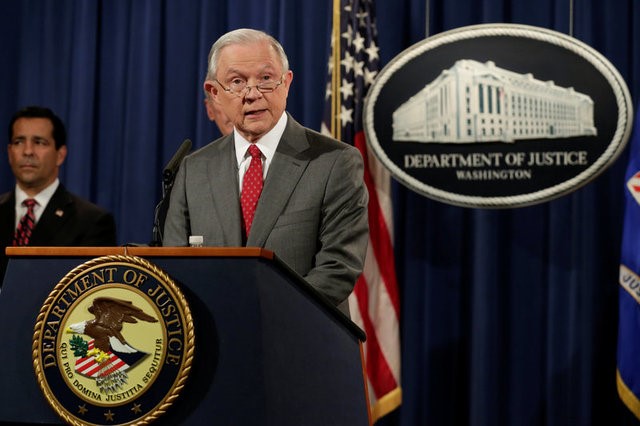By Julia Edwards Ainsley
WASHINGTON (Reuters) - U.S. Attorney General Jeff Sessions, taking up an issue that has infuriated Republican President Donald Trump, went on the attack against leaks on Friday, warning of a possible crackdown both on reporters and their sources inside the federal government.
In a move derided by critics as an attack on the free press, Sessions said the administration was reviewing policies on forcing journalists to reveal their sources.
It is, however, difficult to prosecute members of the news media in the United States for publishing leaked information.
Sessions also told the employees of government agencies to stop leaking and called the issue a matter of national security.
Trump has repeatedly voiced anger over a steady stream of leaks to the media about him and his administration since he took office in January.
Some have been related to probes into Russian meddling in the 2016 U.S. presidential election; others have concerned infighting in the White House.
"One of the things we are doing is reviewing policies affecting media subpoenas," Sessions told reporters as he announced administration efforts to battle what he called a "staggering number of leaks undermining the ability of our government to protect this country."
"We respect the important role that the press plays and will give them respect, but it is not unlimited," the nation's top law official said.
His boss, Trump, has repeatedly criticized news outlets and their work as "fake news," and administration officials have criticized the use of anonymous sources, a standard journalistic practice.
A media subpoena is a writ compelling a journalist to testify or produce evidence, with a penalty for failure to do so.
The fact that the administration is reviewing its policy leaves open the possibility of sentencing journalists for not disclosing their sources.
“Every American should be concerned about the Trump administration’s threat to step up its efforts against whistleblowers and journalists," said Ben Wizner of the American Civil Liberties Union. "A crackdown on leaks is a crackdown on the free press and on democracy as a whole."
Deputy Attorney General Rod Rosenstein told reporters the department was just starting to review the policy on media subpoenas and could not say yet how it might be changed. But he did not rule out the possibility of threatening journalists with jail time.
REPORTERS PROTECTED
Historically, government employees or contractors who give sensitive information to the media are much more likely to be prosecuted than the reporters who receive it.
U.S. regulations give journalists special protections, barring them from law enforcement that might "reasonably impair newsgathering activities."
Federal prosecutors must get special permission from the U.S. attorney general before issuing a subpoena to try to force a member of the news media to divulge information to authorities. New York Times reporter Judith Miller was jailed in 2005 for refusing to reveal a source about stories on Iraq, but she cut a deal with prosecutors before she was formally charged.
In addressing the wider issue of leaks, Sessions said the Justice Department has tripled the number of investigations into unauthorized leaks of classified information and that four people have already been charged.
"We are taking a stand," said Sessions, who in recent weeks has been publicly criticized by Trump for his performance in the job, including for what Trump called his weakness on the issue of going after leakers. "This culture of leaking must stop," Sessions said.
It is not illegal to leak information, as such, but divulging classified information is against the law.
Some of the more high-profile leaks in the Trump administration have revealed White House infighting in articles that would appear not to involve divulging classified information.
Sessions did not immediately give the identities of the four people charged, but said they had been accused of unlawfully disclosing classified information or concealing contacts with foreign intelligence officers.
Rosenstein did not give the exact number of leak investigations the Justice Department is currently handling, only that this number has tripled under the Trump administration.
In the latest major leak to the media, the Washington Post published transcripts on Thursday of contentious phone calls that Trump had in the early days of his administration with Mexican President Enrique Pena Nieto and Australian Prime Minister Malcolm Turnbull.
"No government can be effective when its leaders cannot discuss sensitive matters in confidence or to talk freely in confidence with foreign leaders," Sessions said of that case.
One tool Sessions has for prosecuting leakers is the Espionage Act, a World War One-era law that was designed to stop leaks to America's enemies. Federal prosecutors have used it 12 times to charge individuals for disclosing information to the media, eight of them under Democratic former President Barack Obama.

The most recent case, and the first under Trump, was the Justice Department's indictment in June of Reality Leigh Winner, 25, a U.S. intelligence contractor accused of leaking a classified National Security Agency report about Russia’s alleged interference in the 2016 election.